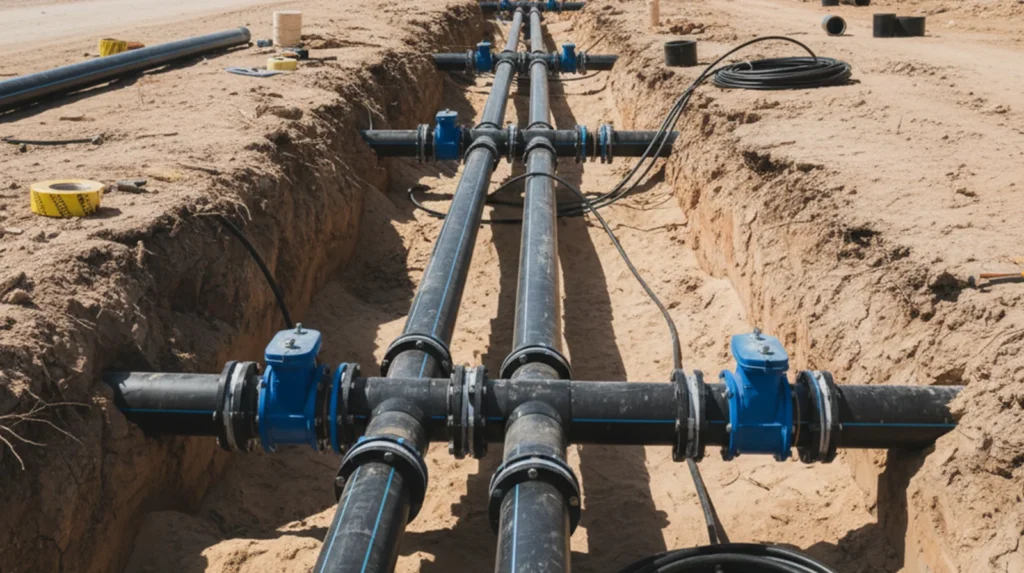Why Safe Drinking Water Matters in Pakistan
The Role of MDPE Pipes in Safe Drinking Water Distribution in Pakistan plays a vital part in ensuring clean and reliable water supply across the country. These pipes are durable, leak-resistant, and ideal for maintaining water quality from source to tap.
Have you ever wondered how the water that flows from your tap stays clean and safe? In Pakistan, where water scarcity and contamination are growing concerns, ensuring access to safe drinking water is critical. As cities and rural areas face increasing pressure on their water infrastructure, the role of MDPE pipes in safely distributing drinking water cannot be overstated.
While many communities struggle with water contamination, the adoption of MDPE pipes has proven to be a game-changer. These pipes, known for their strength, durability, and resistance to chemical reactions, are increasingly used in Pakistan’s water supply systems.
In this post, we will explore why MDPE pipes are crucial for safe drinking water distribution and how they help solve some of the country’s most pressing water challenges.
Key Takeaways:
MDPE pipes ensure the safe transportation of drinking water, reducing the risk of contamination.
They are resistant to corrosion, chemicals, and physical stress, making them ideal for Pakistan’s challenging environments.
The adoption of MDPE pipes in water supply systems contributes to long-term sustainability and public health.
What Are MDPE Pipes?
MDPE (Medium-Density Polyethylene) pipes are a type of plastic pipe used primarily for water and gas distribution. Known for their flexibility and resistance to a wide range of chemicals, MDPE pipes are commonly used in environments where both strength and safety are essential.
Why Choose MDPE?
MDPE pipes offer several advantages that make them the ideal choice for safe drinking water distribution:
Corrosion Resistance: Unlike traditional metal pipes, MDPE pipes do not rust or corrode, ensuring that the water stays clean and free of contaminants.
Durability: MDPE pipes can withstand harsh weather conditions, extreme temperatures, and physical stress, making them highly suitable for both urban and rural areas.
Non-Toxicity: MDPE pipes do not leach harmful substances into the water, ensuring that the water remains potable.
Example: In Lahore, the water authority switched to MDPE pipes for its distribution system, resulting in fewer instances of contamination and increased public trust in the city’s water supply.
Why Are MDPE Pipes Ideal for Safe Drinking Water in Pakistan?
1. Prevention of Contamination
One of the primary concerns with drinking water infrastructure is the potential for contamination. Traditional pipes, especially those made from metal, are prone to rust, corrosion, and leaks, which can introduce harmful substances into the water supply.
MDPE pipes, however, offer a sealed and smooth inner surface that minimizes the chances of bacterial growth or chemical contamination.
Pro Tip: MDPE pipes are designed to be low-maintenance, which reduces the need for frequent repairs that can compromise water quality.
2. Resistance to Environmental Factors
Pakistan’s water supply systems often deal with extreme weather conditions and soil variability, which can negatively impact other types of pipes. MDPE pipes are highly resistant to temperature fluctuations, soil movements, and UV radiation, ensuring longevity even in tough climates.
Real-World Example: In the southern regions of Pakistan, where temperatures can soar above 40°C, MDPE pipes maintain their structural integrity, offering reliable water distribution even in extreme heat.
3. Cost-Effectiveness and Longevity
MDPE pipes offer a cost-effective solution for long-term water supply projects. Their durability and ease of installation reduce the overall maintenance costs associated with water distribution systems. MDPE pipes can last for 50-100 years, making them a valuable investment for municipal water authorities.
How Do MDPE Pipes Contribute to Sustainable Water Systems in Pakistan?
1. Reduction of Water Loss
Leaks and ruptures in old pipelines contribute to significant water loss, a major issue in many parts of Pakistan. MDPE pipes, with their tight seals and leak-resistant fittings, help reduce water loss, ensuring that more clean water reaches the consumers.
Statistics: A study in Karachi revealed that the installation of MDPE pipes reduced water loss by 30%, improving water efficiency and lowering operating costs for local water authorities.
2. Support for Rural Water Distribution
In rural areas where traditional water distribution systems are often outdated or non-existent, MDPE pipes offer a reliable and affordable solution. Their flexibility and ease of installation make them ideal for creating efficient water systems in remote areas.
Case Study: In the rural areas of Punjab, MDPE pipes were used to develop a water supply system that now serves over 50,000 households, providing clean water even in areas that previously had little or no access.
Benefits of MDPE Pipes Over Traditional Alternatives
| Property | MDPE Pipes | Traditional Pipes (Metal) |
|---|---|---|
| Corrosion Resistance | High | Low |
| Installation Flexibility | Easy | Complex |
| Longevity | 50–100 years | 30–50 years |
| Cost | Cost-effective | High maintenance and repairs |
As seen in the table, MDPE pipes outperform traditional metal pipes in several key areas, making them the preferred choice for sustainable water systems.
The Future of MDPE Pipes in Pakistan’s Water Supply
With the increasing demand for clean water, especially in urban centers, MDPE pipes will play a crucial role in Pakistan’s efforts to modernize and expand its water distribution infrastructure.
As the country works towards improving water access, the shift towards plastic pipes like MDPE is expected to grow, driven by the pipes’ ability to meet both current and future needs.
Expert Insight: Experts predict that by 2030, MDPE pipes could make up 80% of the water distribution systems in Pakistan’s major cities, significantly reducing contamination and water loss.
High-Quality Pipes & Fittings – Built to Last
Conclusion: The Path Forward for Safe Drinking Water
MDPE pipes are helping Pakistan tackle its water distribution challenges, offering a sustainable, cost-effective solution for delivering safe drinking water. With their resistance to corrosion, ease of installation, and long lifespan, MDPE pipes are an essential part of ensuring that all Pakistanis have access to clean water, now and in the future.
As Pakistan continues to prioritize water security, the adoption of MDPE pipes will undoubtedly play a central role in shaping the future of the country’s water infrastructure. If you’re involved in water distribution projects or looking to improve your system, it’s time to consider the many advantages of MDPE pipes.
Call to Action: Explore how MDPE pipes can transform your water distribution network. Contact your local supplier for more details on installation and pricing.
FAQ Section:
1. What are the advantages of using MDPE pipes for drinking water systems?
MDPE pipes are highly resistant to corrosion, leaks, and chemical reactions, making them ideal for maintaining clean and safe drinking water.
2. How long do MDPE pipes last?
MDPE pipes have a lifespan of 50-100 years, making them a durable and cost-effective choice for long-term water distribution projects.
3. Can MDPE pipes withstand extreme weather conditions?
Yes, MDPE pipes are highly resistant to temperature changes and UV radiation, ensuring they perform well in Pakistan’s diverse climate.
4. Are MDPE pipes safe for drinking water?
Absolutely. MDPE pipes are non-toxic and do not leach harmful substances into the water, making them safe for potable water applications.
5. How do MDPE pipes reduce water loss?
Their tight seals and leak-resistant design significantly reduce the risk of water loss, helping to conserve water and lower operational costs.
6. Are MDPE pipes suitable for rural water distribution?
Yes, MDPE pipes are ideal for rural areas due to their flexibility, ease of installation, and cost-effectiveness, helping provide clean water to remote communities.
7. What are the costs associated with MDPE pipe installation?
While MDPE pipes may have a higher upfront cost than traditional pipes, their long lifespan, low maintenance, and reduced water loss make them a more economical choice in the long run.


